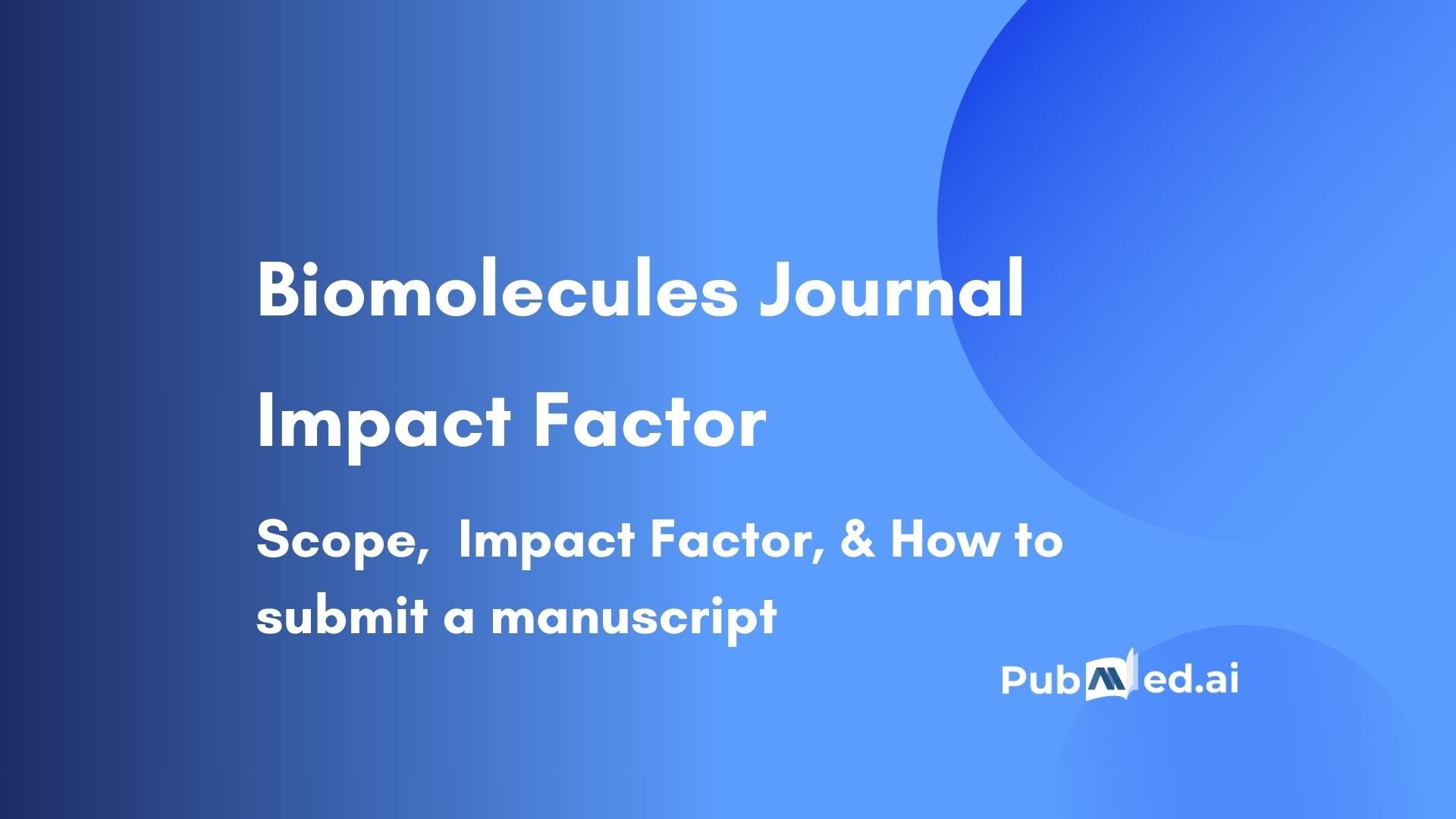Biomolecules Impact Factor: Your Comprehensive Guide

The latest available data for the journal Biomolecules indicates an Impact Factor of 4.8, as reported in the 2024 Journal Citation Reports released by Clarivate in June 2025.
If you're delving into the realms of biochemistry, molecular biology, or related fields, you've likely encountered the journal Biomolecules. Published by MDPI, this open-access journal has garnered attention for its rigorous peer-review process and its focus on the structures and functions of bioactive and biogenic substances. But what exactly does its impact factor signify? How does it rank among other journals? And what are the associated publication fees? Let's explore these aspects in detail.
What is The Biomolecules Impact Factor?
For Biomolecules, the 2024 Journal Citation Reports™ released by Clarivate™ in June 2025 revealed an updated impact factor of 4.8 . This positions the journal in the Q1 quartile (top 25%) within the "Biochemistry and Molecular Biology" category, ranking it 75th out of 319 journals in this field .
he Biomolecules Impact FactorImpact Factor Trends Over the Years
The Impact Factor (IF) of a journal reflects its influence in the scientific community by measuring the average number of citations per article. For Biomolecules, the past five years show some interesting trends:
| Year | Impact Factor (IF) |
|---|---|
| 2020 | 4.9 |
| 2021 | 6.064 |
| 2022 | 6.1 |
| 2023 | 5.5 |
| 2024 | 4.8 |
From 2020 to 2022, the journal’s Impact Factor grew steadily, indicating increasing recognition and citation of its publications. However, in 2023 and 2024, the IF experienced a slight decline. This is not uncommon, as citation rates fluctuate based on the number and type of published articles each year.
How Does Biomolecules Rank in Its Field?
Beyond the impact factor, it's essential to consider the journal's ranking within its category. With an impact factor of 4.8, Biomolecules holds a commendable position in the "Biochemistry and Molecular Biology" category. This ranking reflects the journal's influence and the quality of research it publishes, making it a reputable source for researchers and academics in the field.
What is the Biomolecules Journal Publication Fee?
Understanding the financial aspects of publishing is crucial for researchers. Biomolecules operates on an open-access model, meaning that articles are freely available to readers immediately upon publication. To support this model, the journal charges an Article Processing Charge (APC). As of the latest information, the APC is up to 2700 CHF]. However, it's worth noting that the journal has a waiver policy for these charges, potentially reducing the cost for authors in certain circumstances .
What Other Journals Are Related to Biomolecules?
If you're considering where to publish your research, it's beneficial to explore journals with similar scopes and focuses. Here are some related journals:
- Biomolecules and Biomedicine Journal: This journal focuses on biomedicine and related areas. It has an impact factor of 3.1 and is ranked in the Q2 quartile .
- Biomolecules and Therapeutics Journal: Concentrating on therapeutics and pharmacology, this journal has an impact factor of 3.2 and is ranked in the Q2 quartile .
Each of these journals offers a unique focus within the broader field of biomolecular research, providing various avenues for researchers to consider based on their specific areas of study.
How Can You Submit to Biomolecules?
Submitting your research to Biomolecules is a straightforward process. The journal accepts a range of article types, including original research articles, reviews, and short communications. To submit, visit the Biomolecules submission portal and follow the provided guidelines. Ensure that your manuscript aligns with the journal's scope and adheres to the submission requirements to facilitate a smooth review process.
PubMed.ai - Best PubMed Search
For researchers, students, and clinicians navigating the vast world of biomedical literature, PubMed.ai is an indispensable tool. It helps you quickly find relevant papers, generate intelligent summaries, and analyze research insights with ease. Whether you’re tracking journal impact factors, exploring trends in molecular biology, or preparing structured research reports, PubMed.ai streamlines the process
FAQs
What is the abbreviation for Biomolecules?
The standard abbreviation for Biomolecules is BIOMOLECULES, as per ISO 4 standards.
Is Biomolecules a predatory journal?
No, Biomolecules is a reputable, peer-reviewed journal published by MDPI, a well-established academic publisher known for its rigorous editorial standards.
What is the 5-year impact factor of Biomolecules?
The 5-year impact factor of Biomolecules is 5.6, indicating the journal's sustained influence over a longer period .
How often is Biomolecules published?
Biomolecules is published monthly, providing regular updates on the latest research in the field.
How Can PubMed.ai Help Researchers?
For researchers looking to efficiently navigate biomedical literature, PubMed.ai offers powerful tools to search, analyze, and summarize scientific papers, including journals like Biomolecules. With features like intelligent search summaries, deep literature analysis, and automated research report generation, PubMed.ai helps save time while ensuring you stay on top of the latest scientific insights.
Disclaimer:
This AI-assisted content is intended for academic reference and informational purposes only and does not constitute medical advice, diagnosis, or treatment. Always consult qualified healthcare professionals regarding any medical condition or treatment decisions. All risks arising from reliance on this content are borne by the user, and the publisher assumes no responsibility for any decisions or actions taken.

Have a question about biomedical research or published clinical studies? PubMed.ai helps you explore published biomedical literature with AI assistance.
Subscribe to our free Newsletter